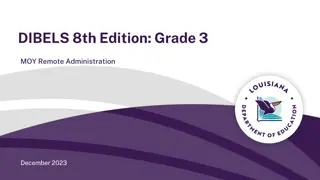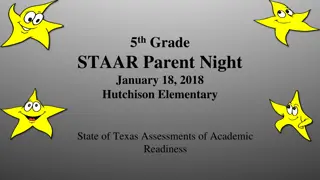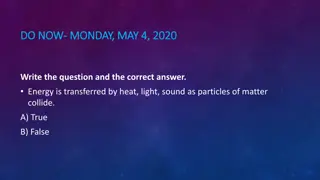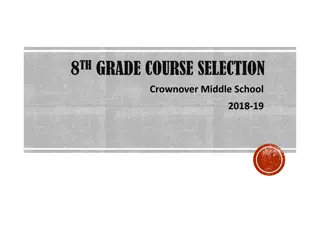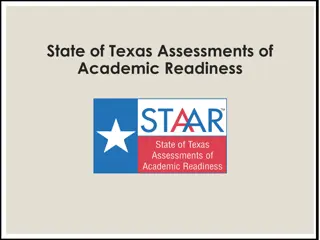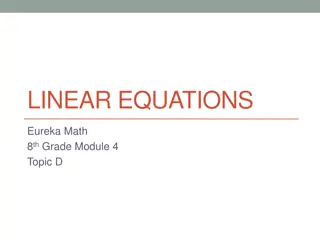8th Grade STAAR Review Questions on American History
The content provides a set of STAAR review questions for 8th-grade students covering American history from 1607 to 1877. Questions include events in chronological order, historical periods, and interpretations of key historical concepts like Manifest Destiny and the United States Constitution. Students need to provide answers with explanations to demonstrate their understanding of the topics discussed.
Download Presentation

Please find below an Image/Link to download the presentation.
The content on the website is provided AS IS for your information and personal use only. It may not be sold, licensed, or shared on other websites without obtaining consent from the author.If you encounter any issues during the download, it is possible that the publisher has removed the file from their server.
You are allowed to download the files provided on this website for personal or commercial use, subject to the condition that they are used lawfully. All files are the property of their respective owners.
The content on the website is provided AS IS for your information and personal use only. It may not be sold, licensed, or shared on other websites without obtaining consent from the author.
E N D
Presentation Transcript
8thGrade Covering 1607-1877
This is SET A STAAR REVIEW QUESTIONS! Label your notebook paper 1-25 with two spaces between each question!
For the next questions you need to write down your answer and an explanation for your answer. Your explanation must be at least two complete sentences! Number your papers 1-25 EXAMPLE: As a result of Manifest Destiny the United States became a world power through A. independence from Great Britain B. westward expansion to the Pacific Ocean C. efforts to stop secession of Southern states D. laws restricting labor union activity
EXAMPLE-Answer: B. westward expansion to the Pacific Ocean Student explains answer: Manifest Destiny was the idea the American should expand from coast to coast because it was their destiny to do so. This caused the U.S. to gain more states and even more immigrants to come to the U.S.
1. Which list of events is in order from earliest to latest? A. arrival of Europeans Revolutionary War colonial period B. Revolutionary War arrival of Europeans colonial period C. arrival of Europeans colonial period Revolutionary War D. colonial period arrival of Europeans Revolutionary War
ANSWER C. arrival of Europeans colonial period Revolutionary War Don t forget to write an explanation!
2. Select the group of events below that is in the correct chronological order A. American Revolution, War of 1812, French and Indian War, Civil War B. French and Indian War, American Revolution, War of 1812, Civil War C. French and Indian War, War of 1812, American Revolution, Civil War D. War of 1812, American Revolution, French and Indian War, Civil War
Answer to #2 B. French and Indian War, American Revolution, War of 1812, Civil War
3. The Preamble of the United States Constitution states the purposes of government and is based on the belief that A. the states have ultimate authority B. members of Congress should be appointed C. Supreme Court Justices should be elected D. the people are sovereign
Answer to #3 D. the people are sovereign
4. Which of the following land was aquired peacefully by the United States? A. Mexican Cession B. Louisiana Territory C. Northwest Territory D. Texas Revolution
Answer to #4 B. Louisiana Territory
5. In the early 1800s the United States was impacted by European conflicts. Which of the following was a significant foreign policy success of President Thomas Jefferson s administration? A. purchase of the Louisiana Territory B. support for the Alien and Sedition Acts C. victory in the war of 1812 D. passage of the Embargo Act
Answer to #5 A. purchase of the Louisiana Territory We should still be writing an explanation for each answer!
6. Which event caused anti-British feelings? A. Boston Tea Party B. Boston Massacre C. Continental Congress D. Boycott of British goods
Answer to 6 B. Boston Massacre
7. As a result of President Andrew Jacksons policies, Native American Indians were A. relocated to reservations in Mexico B. forcibly removed to areas west of the Mississippi River C. gradually allowed to return to their ancestral lands D. given United States citizenship
Answer to 7 B. forcibly removed to areas west of the Mississippi River
8. A primary influence behind the division between the North and the South during the Civil War was A. welfare reform and income tax rates B. immigration policies and westward expansion C. loyalty to Great Britain and taxation without representation D. states rights and the status of slavery in the west
Answer #8 D. states rights and the status of slavery in the west
9. The president sought to end many Federalist programs, lower taxes, and reduce the size of the federal government and the military. The Supreme Court ruled in favor of Secretary of State James Madison and established the principle of Judicial review in the case Marbury v. Madison. The Louisiana Territory was purchased. These remarks best reflect what era of the U.S. history? A. Colonial Era B. Jefferson Era C. Era of Good Feeling D. Reconstruction Era
10.Which of the following events occurred first? A. Lewis and Clark explored lands west of the Mississippi River. B. Thomas Jefferson became president. C. Zebulon Pike explored the Arkansas and Red rivers. D. The Embargo Act was passed.
11. On the 1st day of January in the year of our Lord 1863, all persons held as slaves within any state or part of a state (whose) people shall then be in rebellion against the United States, shall be then, thenceforward, and forever free. This is a quote from the 1.Gettysburg Address 2.Lincoln-Douglas Debates 3.Emancipation Proclamation 4.Thirteenth Amendment
U.S. Doubles in Size with Land Bought from France 12. The following headline appeared in newspapers in which of the following years? 1.1776 2.1803 3.1812 4.1861
13. Which of the following was an economic reason why England established colonies in America? A. they wanted to establish the free enterprise system B. they wanted to purchase cheap ships from America C. they wanted to establish the practice of mercantilism D. they could not afford to feed their people and needed resources
C. they wanted to establish the practice of mercantilism EXPLAIN mercantilism in your own words!
14. The repercussions of this event forced settlers to New England in search of religious freedom A. Spanish Inquisition B. Protestant Reformation C. Black Plague D. The Crusades
15. The British benefited from their mercantilist relationship with the American colonies primarily by A. supporting the growth of colonial industries B. prohibiting colonists from fishing and fur trading C. taking large amounts of gold and silver from the southern colonies D. buying raw materials from the colonies and selling them finished products
D. buying raw materials from the colonies and selling them finished products
16. Whose life is referred to in the timeline? 1.Benjamin Franklin 2.John Smith 3.Roger Williams 4.Roger Sherman He was ordained a minister of the Church of England but discovered Puritanism and joined the American Experiment in Boston. He tried to reform the Church, then separated from it. He insisted land be purchased from the Indians, not taken. He was put on trial in Salem and banished from the Massachusetts Bay Colony. He purchased land from the Narragansett Indians and established the settlement of Providence, Rhode Island. He embraced the idea of religious freedom. 1631 1635 1636
17. The Mayflower Compact, New England town meetings, and the Virginia House of Burgesses are examples of A. early colonial efforts in self-government B. colonial protests against British taxation C. governments imposed by Parliament D. attempts to limit democracy
18. The primary reason for the establishment of the Middle Colonies was A. to escape political turmoil B. economic opportunities C. religious freedom D. opportunity for adventure
B. economic opportunities Explain how this was different from the more northern colonies.
19. The following best describe which group of early colonies? 1. Villages with town meetings 2. Small farms and commercial fishing 3. First American college New England Colonies B. Middle Colonies C. Southern Colonies D. Spanish Colonies A.
20. The Mayflower Compact of 1620 is considered an important step in the development of democracy in America because it A. expressed the importance of self-government B. established freedom of religion C. created the first colonial judiciary D. granted all males the right to vote
21. How did living in the colonies change the way Americans thought about government? A. There was little diversity in the colonies and everyone had similar ideas about government. B. The colonists were generally left alone by England and they took part in running their own government. C. The colonists believed they would always be protected by England and there was no need for their own government. D. Most colonists came to believe that government was unnecessary and they would be better off without it.
B. The colonists were generally left alone by England and they took part in running their own government.
22. What was the greatest consideration for colonists desires to make their own laws separate and apart from England? A. Distance from England B. Taxation rights for loyalists C. Local legal structures D. A voice in state government
23. Which political belief is expressed by the quotation we will not hold ourselves bound by any Laws in which we have no voice, or Representation ? A. necessity for separation of powers B. government by consent of the governed C. freedom of press and assembly D. right to a writ of habeas corpus




